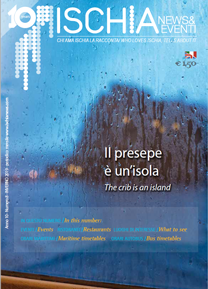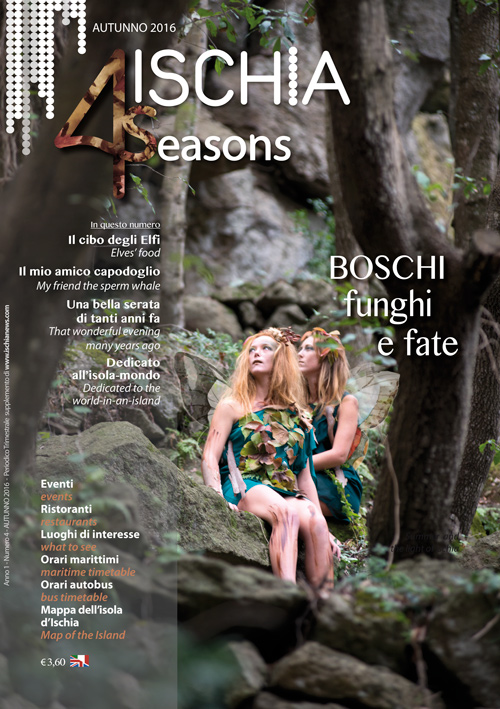The Truman room

The Truman room is the n. 3 and is set on the second floor of the small hotel Di Lustro in the center of Forio. This small hotel of only 10 rooms, was opened in 1931 by Gaetano Di Lustro (1909-1982) and is a XVII century property belonging to the Di Lustro family, one of the oldest of the landed gentry of Forio whose grandfather Filippo was a soldier of Napoleon Bonaparte, died in the battle of Aboukir.
To Filippo Di Lustro is dedicated the street, where is set the hotel, facing the piazza Luca Balsofiore. It is the oldest hotel in Forio and is now carried on by the widow of Gaetano, Gioconda, who is 83 years old and by two daughters Giuseppina who is 62 years old and Maria Teresa, who is 54 years old. To welcome the reporter is Giuseppina who tells us that “today it is very difficult to carry on a small hotel. We are out of the market and destroyed by large hotels with a huge tax burden”. The hotel is the same as 82 years ago with the ladder and the floor of the entrance of lava stone with the “courtyard”, which had to be, in the past, reserved for horses, became a lobby with ornamental plants.
Truman Capote (1924-1984), one of the greatest American writers of the twentieth century and inventor of the “novel-truth”, was just 25 years old in 1949. He was already a famous writer, “child prodigy” of the American literature, with the success of his first book, “Other Voices, Other Rooms” where he begins to tell his life by the character of Joel who makes several attempts to become a normal guy like his mother and everyone else wanted he was and instead he accepts his destiny: to be a homosexual, to always hear other voices and to always live in other rooms. In the great room 3 of the Di Lustro Hotel with the beautiful views of the Marina, Truman lived for ninety-seven days - from March 23 to June 13, 1949 – and Mrs. Giuseppina shows us the old registry with the record of arrival and departure. Capote is at room number 591 of the register and at the number 590 is the name of Jack Dunphy who was a companion of Capote for thirty-eight years occupying the room 2, next to that one of Truman. At number 593 appears in the register the name of Thomas Lanier Williams that is Tennessee Williams (1911-1983), the great American playwright, author of “A Streetcar Named Desire”. But Williams remained only a few days, just 9, from March 24 to April 2,1949 occupying the room n. 5 on the other side with a view of the mountain.
Ms. Giuseppina was 19 years old in 1949 and was the waitress in the small hotel - one of the 4 of Forio, all small structures (the others were Villa Carolina, Nettuno and the Tirrenia) - and still remembers that “young blond boy, short, with a shrill voice, who with his friend held parties on the terrace”. Capote has immortalized the woman in his reportage “Ischia” contained in his book “Local Color” appeared in Italy in 1954 and published by Garzanti, while the report came out on “European”.
The stay of Truman Capote in Forio with Jack Dunphy is contained in the detailed Gerald Clarke’s biography (1988) (Capote: A Biography). Clarke, Time journalist and Capote’s friend, took “fourteen years and hundreds of hours in interview to compose this sincere and so scandalous biography of a brilliant and unruly writer in every sense, ambitious and blatantly homosexual, fell back into drug abuse on August 24, 1984”. He was not yet 60 years old.
Truman and Jack wanted to go to Sicily, but opted for a trip to Ischia “in the tiny village of Forio”, writes Clarke, and forgot Sicily”.
“What strange place and strangely enchanted is this one - Truman wrote to Bob Linscottt – it is an island off the coast of Naples, very primitive, inhabited mostly by winemakers and shepherds, by WH Auden and the Mussolini family”. To Cecil Beaton he wrote: “It’s really beautiful and strange, we occupy almost an entire floor right on the seafront, the sun is as hard as diamond and everywhere there is the pleasant south smell of wisteria and of the leaves of lemon”. Clarke says that “the hotel had no running water and it supplied, for only two hundred dollars a month, two nice rooms, breakfast and two five-course meals a day, accompanied by good wine of Ischia”. Truman was working on his second novel “Summer Crossing” which was published posthumously in 2005.
“Ischia remained for him a place of happiness. Its main charm was neither the sun nor the sea, nor Auden or Mussolini family, it was Jack”, Clarke writes in his biography. Maybe. But Truman describes his meeting with Ischia in his reportage in an unparalleled way:
“I always thought that the islands are like big ships kept permanently at anchor. Putting your foot on the ship is like to begin climbing the gangway connecting the ship to the mainland: you are immediately taken by a wonderful sense of isolation and it seems that nothing can happen, neither bad nor unpleasant . So when the “Princess” began to see the Porto of Ischia, and as we saw the side, it was beautiful and exciting like listening to the beating of your own heart.
Meanwhile, during the confusion of the landing, the watch fell down and broke.
It was significative: it was immediately clear that Ischia is not a place where it is necessary to have an exact concept of time”.
Truman Capote remained in Forio on the island of Ischia the entire spring and never returned. His room on the second floor was occupied by hundreds of other guests of the Di Lustro Hotel “because everyone asks the Capote’s room”, says Ms. Giuseppina.
At the end of 1949, Capote gave to his American publisher all travel articles, nine in all, in order to be collected in a book entitled “Local Color”.
The article of his stay on the island of Ischia appears in the pages ranging from the ninety to eightieth. Capote writes, concluding: “We followed the spring. In four months since we arrived, the nights have become hot, the sea became more calm, the green water, still winter in March, has turned into blue in June, and vineyards, then gray and bare on their twisted poles, cover of the first green grapes. There are swarms of butterflies just born and in the mountain many sweet things to bees, in the garden, after a shower, we can hear, yes, barely perceptible, the unfolding of new buds. And as soon as we wake up, a sign of summer, and in the evening linger until late at night and this is another sign. It is difficult to stop up in the house in such nights, the moon falls nearest and winks on the water with amazing splendor, and along the parapet of the fishermen’s church, which juts out into the sea like the prow of a ship, young people go to and fro, whispering, then cross the square, take refuge in some dark secluded corner. Gioconda, the maid, says that it was the longest spring she can remember: the longest and the most beautiful one”.
It was also for Truman.
























